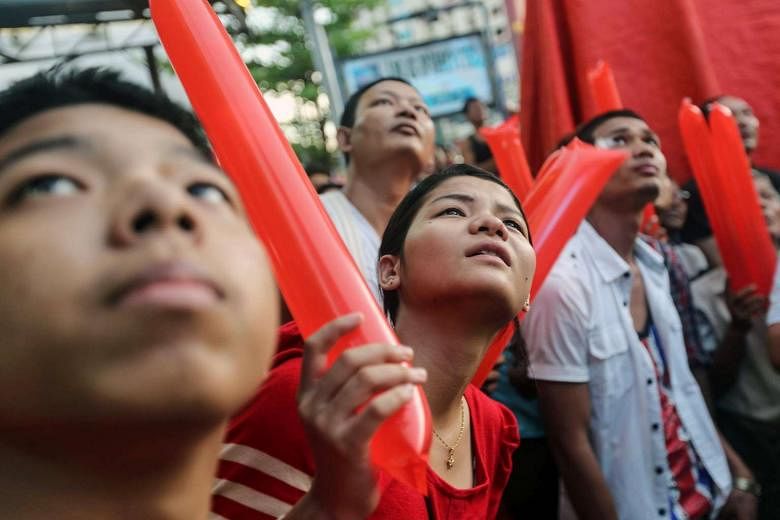YANGON - Millions queued up on Sunday (Nov 8) to vote in Myanmar's general election.
Here is some background on the country and why this election is so important:
1. ABOUT MYANMAR
Wedged between India and Bangladesh to the west, China to the north and Laos and Thailand to the east, the South-east Asian country was formerly known as Burma.
Blessed with a bounty of natural resources - from rubies and jade to gas, oil and teak - the fertile and diverse Burma was once also famed as Asia's rice bowl.
Its former capital Rangoon, now Yangon, was once one of the most fashionable cities in Asia, and home to stately leafy boulevards and British colonial buildings.
The country, with a current population of 54.5 million, is home to more than 100 ethnic groups. The majority are Burman and Buddhist but sizeable minorities weave a host of distinct cultures and traditions into the landscape.
2. INDEPENDENCE AND MILITARY TAKEOVER
Burma gained independence from Britain in Jan 4, 1948, but a military junta took power in a coup in 1962, turning the country into an authoritarian one-party state.
The junta changed the country's name to Myanmar in 1989, and Rangoon's name to Yangon. It also named an isolated new city Naypyidaw as the country's capital.
The control of the junta made Myanmar a pariah state, subject to Western sanctions.
Nearly half a century of ruinous economic policies by the former junta saw the people sink into poverty, and the country plunged into isolation.
3. THE EMERGENCE OF AUNG SAN SUU KYI
During World War II, the Japanese-occupied country saw a new hero in General Aung San, who fought against the occupiers in the hope of achieving independence. However, he was assassinated just before he achieved his goal.
His daughter Aung San Suu Kyi later emerged to fight against the military junta for democracy.
4. PREVIOUS ELECTIONS
The National League for Democracy (NLD), led by Ms Suu Kyi, won the elections of 1990, but the junta ignored the results and Ms Suu Kyi was placed under house arrest for 20 years.
The elections in 2010 were boycotted by the NLD. Subsequently, the military-backed Union Solidarity and Development Party (USDP) claimed victory in elections decried as being neither free nor fair.
The NLD contested in 2012 by-elections and won a landslide victory, and Ms Suu Syi was sworn into Parliament.
5. SURPRISING CHANGE
In a surprise move, the junta relinquished power in 2011 to a nominally civilian government under former general Thein Sein, who became president.
The nation's fortunes have improved. Gross Domestic Product is growing at an average of 7 per cent a year. Myanmar has started to embrace global trends and consumerism.
The World Bank has even predicted that Myanmar will become the world's fourth fastest-growing economy by 2017.
6. CURRENT ELECTION
The general election that took place on Sunday (Nov 8) was the first contested by the NLD in 25 years. Observers said the poll was peaceful - a landmark achievement in a country that had only recently emerged from decades of military rule.
The election was for 498 seats in both houses of Parliament, as well as hundreds of seats in state assemblies.
The 498 seats constitute 75 per cent of the total seats in Parliament; the remaining 166 seats (25 per cent) are appointed by the military commander-in-chief. The military also has a reserved bloc of 25 per cent of seats in the state assemblies.
Besides the NLD and the ruling USDP, there are more than 90 registered political parties, many of them representing the large ethnic minority populations.
More than 6,000 candidates were fielded.
7. WHAT WILL HAPPEN NOW?
Many predict a clear win for the NLD, going by the results of past elections, which means Ms Suu Kyi can finally take control of the country.
If this translates to an outright majority - 67 per cent of the 498 seats - the NLD can install an ally as president. However, it will not be Ms Suu Kyi as she is barred by the military-drafted Constitution from taking the post, as her late husband and two sons are British citizens.
8. WILL THERE BE A SNAG?
The cards are not stacked equally, as the ruling USDP needs only 33 per cent of votes to form a majority.
This is because under the Constitution, a quarter of the legislative seats are reserved for military appointees, who would be allied with the USDP.
Thus, even if the NLD gets the most seats in the election, the USDP could still determine the presidency by forming a coalition with the 25 per cent army and ethnic parties, which analysts think unlikely since the ethnic parties have been waging war against the military for decades.
Also, if the NLD failed to seize control of the Upper House, Ms Suu Kyi will then likely look to ethnic parties for coalition partners - a tricky political game.
SOURCES: AGENCE FRANCE-PRESSE, REUTERS, BBC

